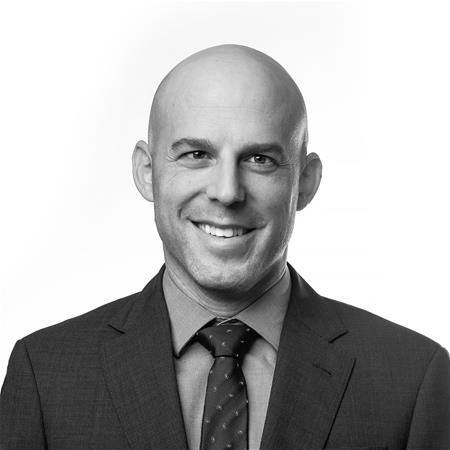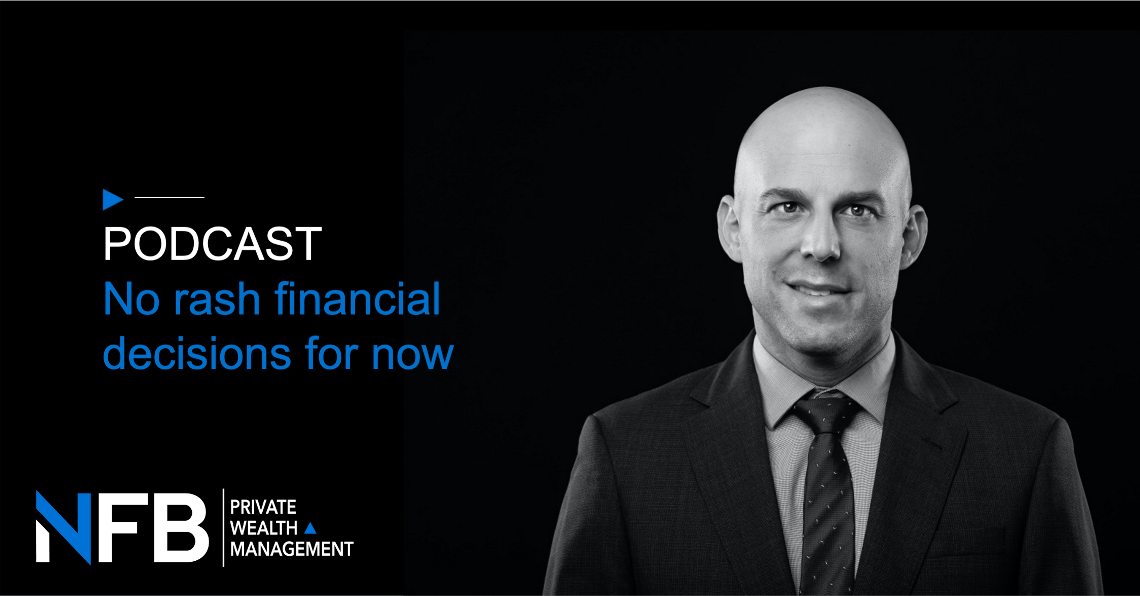Podcast - No Rash Financial Decisions for Now
We are in uncharted territory and it’s important to stay connected, stay informed and to not make ill-considered decisions.


In the context of current market volatility this is a prickly topic but one that needs to be addressed by both advisers and clients.
This podcast and the full transcription that follows was originally published on Moneyweb, Tuesday, 17 March 2020. Recorded on Thursday, 12 March 2020.
Eleanor Becker: Welcome to this financial adviser podcast: our weekly podcast, where I speak to leading financial advisors. Chatting to me today is Stephen Katzenellenbogan, Senior Executive and Private Wealth Manager at NFB Private Wealth Management.
Welcome Stephen. What investment strategies is NFB following in the current uncertainty and volatility in the markets?
Stephen Katzenellenbogen CFP® : Markets are, as we all know, very tricky at the moment. You’ve had, what some market commentators are calling a double black swan event. So we’ve got Coronavirus that’s had a big knock on effect on the market. We started the year in a relatively euphoric state. But that’s been knocked by coronavirus and secondly, the oil price shock. So in terms of investment strategy, I think the important thing is to follow a rational and sensible approach and not to make any rash movements.
So our approach is at our business level, we don’t make stock-specific calls. We’re rather allocators of capital. So we’re keeping very close contact with our money managers and stock brokers that are looking after client funds, just to make sure what they’re up to and what they’re thinking. But I think overall the view is the same: no rash decisions for the time being.
And I think fortunately, and it didn’t relate to the start of this year, but towards the end of last year, we actually started taking some profit off global equity from our clients, because we had had three years of really great hard currency returns. So that would have benefited clients and given some comfort to them in what’s definitely an unnerving time.
Avoiding investment mistakes
Eleanor Becker: So as you say, ‘rational and sensible decisions’ – our investors tend not to be rational and sensible. What mistakes do you see them making or threatening to make in the current environment?
Stephen Katzenellenbogen CFP®: I think the biggest mistake is to listen to emotions and make quick decisions at the wrong times. So I think there are two issues there. There’s a common saying that says it’s all about ‘time in the market’ and not ‘timing the market’.
So if you elected to pull your money out the market now and rather sit on the sidelines, that in isolation may be a good strategy, but it’s getting back into the market that’s extremely tricky.
And timing that, if you look at it from a JSE perspective, although it’s applicable globally, if you took the last 20 years of trading on the JSE (that’s roughly 5 000 trading days) and you had invested R1 million at the start of that period, you’d end up with R10.5 million at the end of that 20-year period.
If you miss just the best 10 days of those 5 000 your return drops from R10.5 million to R5.6 million, which is staggering. I mean, it’s a fraction of a percentage of the days, with massive implications.
If you miss just the best 10 days of those 5 000 your return drops from R10.5 million to R5.6 million, which is staggering. I mean, it’s a fraction of a percentage of the days, with massive implications.
So I think it’s a time for clients to assess their portfolio position to make sure that it is invested correctly and if they are going to make any adjustments, take some time to think about it before doing anything. And I think if you had to maybe look at the long-term risk it’s that investors shift to structurally lower-risk portfolios and we know that that’s detrimental to long-term returns, because risk or volatility risk … is very important to portfolios in long-term growth. I think you’ve got the short-term risks and the potential long-term risks that clients need to manage at the moment.
Eleanor Becker: So for people who aren’t your clients, what should they be demanding of their advisors to make sure that their money is safe?
Stephen Katzenellenbogen CFP®: I think at the moment communication is important and interestingly, I think when markets are going very well you could more easily justify perhaps not having professional advice. But I think when markets get tricky, like they are now, the value in that professional advice really comes through. So I think for those people, our clients and non-NFB clients…it’s [important to] just communicate that that person on the other side is there to help you. So pick up the phone and rather discuss your concerns than discussing them with your friends over coffee and perhaps making some bad decisions.
Covid-19’s effects on retirees
Eleanor Becker: So obviously the topic of everyone’s conversations at the moment is Covid-19. How much of a threat is it to South African investors and to retirement savings long term?
Stephen Katzenellenbogen CFP®: You know, it’s going to be one of those things that we’re going to have to watch play out and see what the long-term impact is. If we look at it in the current moment – and we know it does change daily – there definitely are economic shocks and economic shocks that are going to filter through global economies. And I think on the flip side of that is you’re going to have, countries and sovereigns and central banks doing everything they can to try and help investors. So that may mute some of the long-term effect. So in terms of being a threat, you can see it in the numbers now that markets have taken a dip in the short term. The longer-term numbers, especially in developed market equity, still look attractive.
So, you can say those who are retiring now are the ones at greatest risk and those retiring in 10 years have got plenty time to work it out the system.
So, you can say those who are retiring now are the ones at greatest risk and those retiring in 10 years have got plenty time to work it out the system.The difficulty is, we call it in our business banking ‘the big number’: so for a retiree, they look at the highest recent value of their pension or provident fund and that’s the number they look at. But you have to go and look back over the last 10 or 20 years of your savings, see what your return has been and it may be not that bad. But with that said, no matter how good your historical return is, if you’re retiring right at this point, to have a 10% or 15% drop in your values, is significant and it will impact people.
Eleanor Becker: What advice do you give that person [someone retiring right now]?
Stephen Katzenellenbogen CFP®: I think you have to be sensible in terms of what you’re going to draw from your portfolio. So perhaps if you had planned to retire in the next day and go on a six-month cruise, think about postponing that and perhaps any big spends that you had planned upfront. Be as reasonable as you can with the income that you’re drawing from the portfolio. Because while it may be okay now when you’re retiring, you may have a 30- or 40-year time horizon. And what you do now is very important for that long term. So be reasonable in your drawing. If you know that your portfolio can’t sustain your drawings see if you can get some contract work, extend your work, do something.
Eleanor Becker: With withdrawal percentage rates, I feel like there’s been a lot of communication from the industry to clients saying, you’ve got to keep that percentage rate quite low. Do you think that it’s having an impact or do you think people still don’t get it?
Stephen Katzenellenbogen CFP®: You know, I don’t think it’s that people don’t get it. I think it’s people’s reality. So that reality is you have X but you need Y. And from that person’s point of view, that Y they can’t budge they’re at the lowest of what they can do. And it’s about reassessing your own personal views and what you actually need to do this. I think the industry has been quite good at communicating reasonable drawdown levels, depending on your age and income needs and all those bits and pieces. So I think you’ve got the investors or retirees in two different pots: some who will ignore it and some [for whom] the reality is they have to do it.
Protection from market anomalies
Eleanor Becker: Just to go, it’s a little bit more in depth on this question, how do you protect investments as a wealth manager and savings from anomalies like the effects of the coronavirus and other short-term events that rock the market?
Stephen Katzenellenbogen CFP®: I think the first step … is not not to crystallise losses unnecessarily. So it’s rather to be patient and to watch the portfolios with a good understanding of what’s going on. And then I think it’s back to investment basics 101: diversification. So you need to have adequate diversification across the asset classes, across geographies and across different investment managers. Because if you just look at a very focused area and something that’s very topical, like Sasol at the moment, you’ll see some of the managers have had very positive views on Sasol and they hold exposure in their portfolios and others have had very negative views and they don’t hold anything in their portfolios. And it’s having that diversification that supports a lower-volatility portfolio and strong long-term returns.
Eleanor Becker: Do you see any opportunities in the market at the moment?
Stephen Katzenellenbogen CFP®: So at our business level, we don’t take stock-specific opportunities, but I was speaking to the head of the NFB Asset Management this morning, just to get a sense of what they are doing. And their strategy at the moment is they’re trimming down a bit on the foreign equity holdings and they’re going to bring that back and reinvest that into the JSE and there are two drivers there. The smaller of those drivers is that we feel that the rand is structurally weak at the moment.
And secondly, the relative underperformance of the JSE to developed markets now has been huge. So if you look at it from a dollar perspective in open the beginning of the market drop off till now, the JSE in dollar terms is down, excluding today, approximately 27-odd percent in dollars, whereas if you look at your MSCI World Index in dollars, that’s down about 17% in dollars. So that relative underperformance is big. So they’re not making massive shifts but it’s rather take a bit of profit from somewhere and put it somewhere else with this value.
Eleanor Becker: And there’s quite a lot of flexibility for them to do that?
Stephen Katzenellenbogen CFP®: Sure. Within a fund, a fund manager or unit trust can act much quicker than an individual can. So they are always able to act a lot more nimbly in a portfolio than at the higher level. So if you decide to move out one asset and into another it can take a couple of days to get out, sell repass into the new investment. We’re a portfolio manager can sell and buy in today. They’ve, they’re very nimble in terms of how quickly they can move.
Eleanor Becker: There’s always a lot of criticism in the industry on adviser fees, but I suppose … you’re paying for times in the market like this.
Stephen Katzenellenbogen CFP®: Yes, definitely. So your costs are important and it’s not like, well, I need the advice, I’m just going to pay anything for it. So it’s about being sensible and understanding what you actually pay the adviser, but where an adviser can benefit you from the advice perspective, as well as the other cost perspectives…. it’s been another hot topic: that whole passive versus active element of portfolio management: I think in a market environment like this, it’s going to come to the fore and you’re actually going to start seeing the benefit of that active management versus that passive management now. Because I think you’re going to get a lot of herd mentality coming through in the active management people dumping unnecessarily pushing general indices down and where those clients may actually be more prejudiced than active managers.
Eleanor Becker: That was Stephen Katzenellenbogan, Senior Executive and Private Wealth Manager at NFB Private Wealth Management.
NFB prides itself on the fact that we are Independent Wealth Managers, partner with us on your financial journey.
Interested in more of Stephen's articles? Follow him on Moneyweb and LinkedIn.
#KnowledgeIntoWealth #NFBInsights













